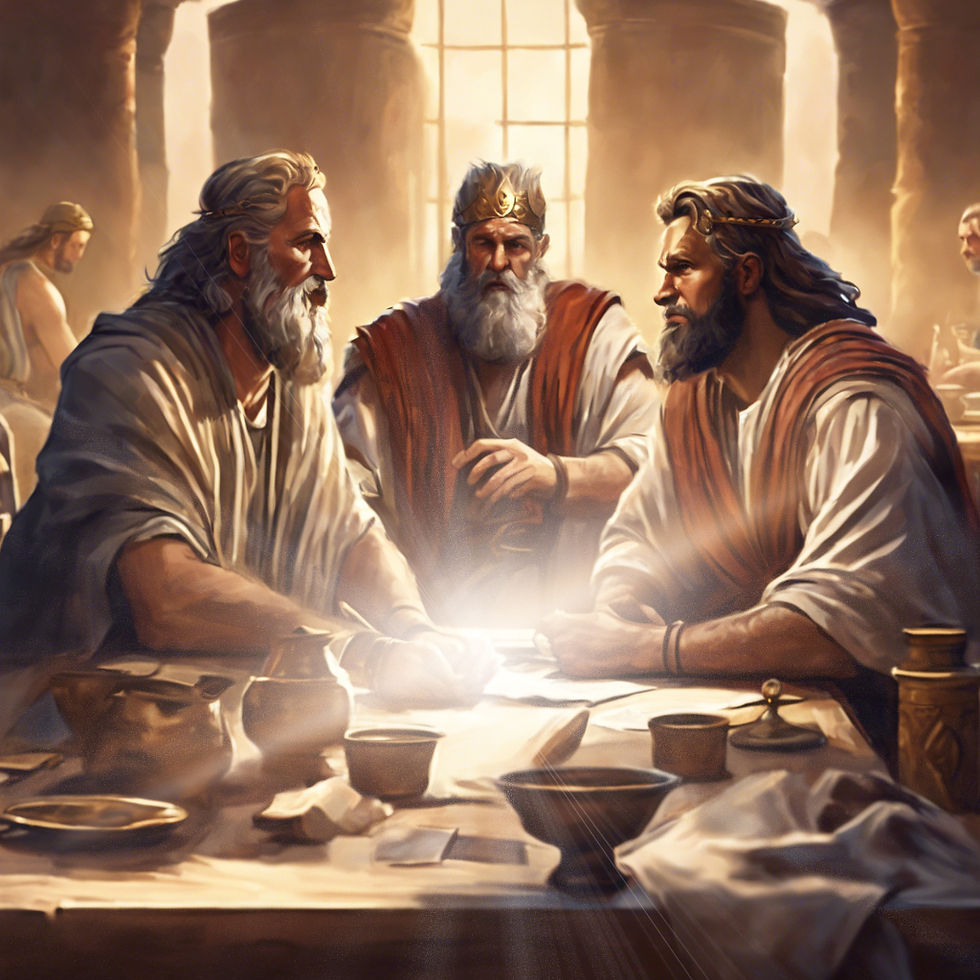Rebellion in the Palace: Vashti & Esther - Two Queens, Two Destinies that Foreshadowed the Messiah, Jesus!

The stories of Vashti and Esther in the Book of Esther offer a captivating story of leadership, courage, and divine intervention. These two women, both queens married to King Xerxes, navigate challenges that test their convictions and reveal profound truths about faith and fate. Their story not only illustrate the complexities of power and obedience but also foreshadow themes of redemption and salvation that resonate throughout biblical history, ultimately pointing towards a greater narrative of God's sovereignty and His plan for humanity's deliverance through Christ.
In the book of Esther, Queen Vashti is seen as a beloved figure among the women of the kingdom, as evidenced by her hosting parties for them, according to Esther 1:9:
"Queen Vashti also gave a banquet for the women in the royal palace of King Xerxes."
However, after seven days of revelry, King Xerxes, in his drunken state, summoned Vashti to appear before him to display her beauty, as described in verse 11:
"To bring Queen Vashti before him wearing her royal crown, in order to display her beauty to the people and nobles, for she was lovely to look at."
Vashti refused the king’s command, as stated in verse 12:
"But when the attendants delivered the king’s command, Queen Vashti refused to come. Then the king became furious and burned with anger."
The reasons for her refusal are speculative. Perhaps she was tired of the king's drunken antics after days of feasting, or she felt degraded by his request. Regardless, her refusal had significant consequences. Being the queen, her actions were closely watched and scrutinized by the entire kingdom. Her decision to disobey the king was problematic due to her influential position and the love and admiration she commanded from other women.
This act of rebellion posed a significant threat. It was feared that her disobedience would set a precedent, encouraging other women to defy their husbands. To prevent this, her defiance needed to be addressed. Esther 1:15:
"According to law, what must be done to Queen Vashti?" he asked. "She has not obeyed the command of King Xerxes that the eunuchs have taken to her."
In verse 16, the concern extends beyond the king’s personal affront:
"Then Memucan replied in the presence of the king and the nobles, 'Queen Vashti has done wrong, not only against the king but also against all the nobles and the peoples of all the provinces of King Xerxes.'"
The fear was that her behavior would lead to widespread contempt and rebellion among women throughout the kingdom, as explained in verse 17:
"For the queen’s conduct will become known to all the women, and so they will despise their husbands and say, ‘King Xerxes commanded Queen Vashti to be brought before him, but she would not come.’"
To prevent this, it was decided that the king would divorce Vashti and replace her with someone more compliant. This decision was aimed at ensuring that all wives would honor their husbands, thus restoring order and respect within the kingdom. Consequently, a year-long process of purification was initiated to select the next queen and so enters Queen Esther.

Esther arrives on the scene as an orphaned Jewish girl raised by her cousin Mordecai in Susa and is chosen among many young women to participate in King Xerxes' beauty pageant (Esther 2:7-8). Through God's favor, Esther impresses Hegai, the king's eunuch, during her preparation and wins favor with King Xerxes when her turn arrives (Esther 2:15-17). She conceals her Jewish identity as Mordecai advises (Esther 2:10). Mordecai's vigilance at the king's gate leads to his discovery of a plot against the king, which Esther later reports, establishing her credibility and setting the stage for her pivotal role in confronting Haman's plot against the Jews (Esther 2:21-23; 3:1-6).
You can read about Queen Esther in the Book of Esther, found in the Old Testament of the Bible (Esther 1-10). In summary, Esther (now Queen Esther) was a Jewish woman who bravely risked her life by approaching King Xerxes without being summoned (opposite of Queen Vashti who refused the Kings summoning of her), defying royal protocol. She did so to plead for the salvation of her people (which the King did not know she was Jewish), who faced genocide due to a decree issued by Haman, an influential official in the Persian court who, later, his hung and all his sons killed. Esther's courageous intervention led to the reversal of the decree, ensuring the safety of the Jewish population in Persia. Her story showcases remarkable bravery, faithfulness, and sacrificial leadership.
One great lesson in the story of Queen Vashti and Queen Esther is that the higher one stands in leadership, the greater the responsibility and scrutiny they face. Leaders and influencers must act with integrity and wisdom because their actions have far-reaching impacts. The fall from a high position can be catastrophic, not just for the individual but for all who look up to them."To whom much is given, much is expected." — Luke 12:48

Moses, the leader of the Israelites, faced severe consequences when he disobeyed God's command at Meribah. Instead of speaking to the rock to produce water as instructed, he struck it, resulting in God's decision to deny him entry into the Promised Land (Numbers 20:12).
King Saul, Israel's first king, faltered in his leadership when he disobeyed God's direct commands regarding the Amalekites. His failure to completely destroy them and his premature offering of sacrifices led to God rejecting him as king, marking the beginning of his downfall (1 Samuel 15:23).
King David, known for his military prowess and poetic talents, experienced profound personal and familial turmoil due to his moral failing with Bathsheba. His adultery with her and the subsequent murder of her husband, Uriah, resulted in the death of their child and ongoing strife within his household, highlighting the far-reaching consequences of moral lapses in leadership (2 Samuel 12:10-14).
In leadership, it is important to recognize that even a single mistake can overshadow countless good deeds. One ill-thought-out action can eclipse a lifetime of positive contributions. Therefore, those in positions of authority must always strive to uphold the highest standards of conduct and decision-making.What I find most ironic is that the King sets out to find a more obedient and compliant Queen, yet Queen Esther displays her own rebellion and defiance, but in a very different way and for different reasons. Let's take a closer look:
Similarities between Queen Vashti and Queen Esther:
Both Queen Vashti and Queen Esther held the title of Queen and were married to King Xerxes (Ahasuerus). Each woman, in her own way, defied the king's expectations and broke the rules set before her. Their acts of defiance were public and widely known throughout the kingdom, marking significant moments that resonated beyond the palace walls, impacting the entire realm.

Differences between Queen Vashti and Queen Esther:
Vashti's defiance arose when she refused King Xerxes' order, or summons to APPEAR before him and his guests. Her decision, which went against the king's expectation of displaying her beauty in front of others, likely stemmed from a sense of personal dignity or discomfort with the objectification involved. In contrast, Esther's act of defiance was driven by a far more urgent and selfless cause. She risked her life by approaching King Xerxes WITHOUT being summoned, a direct breach of protocol, to intercede for her people facing imminent destruction.
Esther's courageous action reflected her deep commitment to protecting her community, demonstrating a willingness to defy royal protocol for the greater good.In terms of outcome, Vashti faced the consequence of being removed from her position as queen after her refusal to obey King Xerxes' command. This decision underscored the king's authority and the expectation of obedience among his subjects. In contrast, Esther's bold move of approaching the king without summons led to a different outcome. She found favor with King Xerxes, which not only spared her life but also paved the way for her to advocate successfully for the Jewish people facing annihilation.
Esther's motivation differed significantly from Vashti's: while Vashti's refusal appeared to stem from a personal sense of dignity or discomfort with the king's demand, Esther's actions were driven by a deep and selfless desire to protect her people from a grave threat of genocide. Understanding God’s Perspective:
While it seems God honors those who act with selflessness and in righteousness, it is important to note that God used both Vashti and Esther greatly to perform His will. He used Vashti's refusal to announce Esther into the story line:
Esther 4:16: "Go, gather all the Jews who are present in Shushan, and fast for me; neither eat nor drink for three days, night or day. My maids and I will fast likewise. And so I will go to the king, which is against the law; and if I perish, I perish!"
Proverbs 21:1: "The king’s heart is in the hand of the Lord, like the rivers of water; He turns it wherever He wishes."
Romans 8:28: "And we know that in all things God works for the good of those who love him, who have been called according to his purpose."
What This Tells Us About God:
Esther's courageous actions reveal profound truths about God's character and His interaction with humanity. Firstly, they demonstrate God's honor for selflessness, as Esther willingly risked her life to save her people, reflecting His heart for love and protection towards others.
Lastly, Esther's journey highlights God's favor towards those who align with His will and act for the greater good. Her favor with King Xerxes not only protected her but empowered her to intercede effectively.
Both women broke the rules, but Esther’s actions were driven by a higher calling and aligned with God’s plan.
In a very beautiful way, the story of Esther can be seen as foreshadowing aspects of Jesus Christ's life and mission, drawing parallels that highlight deeper spiritual truths:
Self-Sacrifice for Others: Esther's willingness to risk her life to save her people mirrors Jesus Christ's ultimate act of self-sacrifice on the cross. Both Esther and Jesus placed the welfare of others above their own safety and comfort. Esther approached the king despite the risk of death, while Jesus willingly went to the cross to save humanity from sin and death.
Intercession and Salvation: Esther's role as an intercessor for her people draws parallels to Jesus Christ as the ultimate mediator between God and humanity. Esther pleaded for the salvation of the Jewish people before King Xerxes, just as Jesus intercedes on behalf of believers before God the Father (Hebrews 7:25).
God's Sovereign Plan: In both stories, God's sovereign plan is evident despite initial appearances of danger or hopelessness. Esther's bravery and strategic timing were instrumental in fulfilling God's purpose to preserve the Jewish people from destruction. Similarly, Jesus' crucifixion, though initially appearing as a defeat, was part of God's plan for redemption and salvation for all who believe (Acts 2:23).
Favor and Blessing: Esther found favor with King Xerxes, leading to blessings and deliverance for her people. Similarly, Jesus, who is described as having found favor with both God and man (Luke 2:52), brings eternal blessings and salvation to all who receive Him (John 1:12).
Courage in the Face of Opposition: Both Esther and Jesus demonstrated courage and faithfulness in the face of opposition. Esther risked her life to confront injustice and save her people, while Jesus courageously faced persecution and death to fulfill God's redemptive plan.
Overall, the story of Esther serves as a powerful narrative that foreshadows Jesus Christ's sacrificial love, intercessory role, and the fulfillment of God's sovereign plan for salvation. Through Esther's bravery and God's providence, we see glimpses of Jesus Christ as the ultimate Savior who willingly laid down His life to reconcile humanity to God and secure eternal life for all who believe in Him.
Copyright © Amanda Allen, Kingdom Revelations, 2024. All rights reserved. This article may be shared with acknowledgment of the author and the original source. Artwork included.






.jpg)
.jpg)
Comments